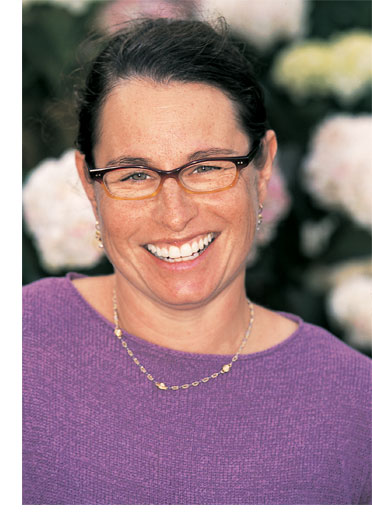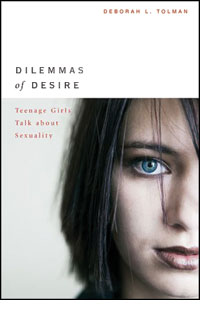 |  | |||
 A Questioning Mind The questions Deborah Tolman asked have changed the way people think about teenage girls and sexuality. Professor Deborah Tolman uses her hands as she talks, sweeping them up in an imaginary bell curve. She is mapping the way teen girls behave and think about their sexuality. The ends of that curve, where teens are either more chaste or more aggressive, are getting longer, she says, "as if someone has grabbed them and pulled them out a bit. But for the vast middle, my sense is that it's still a minefield, and girls are still not entitled to their own sexuality." As the director of the San Francisco State Center for Research on Gender and Sexuality, Tolman is one of the country's preeminent experts on teenage sexuality and sexual health. From the classroom to the set of ABC's "Nightline," she challenges commonly held beliefs on these subjects and asks thought-provoking questions. "We only know what we ask," she says. "The tagline of our center is, 'Producing new knowledge to advance social justice and social change.' But I'm thinking that 'Asking new questions to advance social justice and social change' is more accurate." The Harvard-trained developmental psychologist has studied how television viewing affects teenage girls' and boys' sexual behavior and worked on expanding the definition of adolescent sexual health beyond avoidance of pregnancy and HIV. She has also examined gender inequities in middle school as well as the effect of gender beliefs on teenagers' intimate relationships. Tolman's book "Dilemmas of Desire: Teenage Girls Talk about Sexuality," just out in paperback from Harvard University Press, won the 2003 Distinguished Book of the Year award from the Association for Women in Psychology. Her research has led her to the radical conclusion that girls need to have the freedom to be in touch with all their feelings -- including sexual ones -- to be healthy human beings.
After all, teenage girls are rarely told that it is okay to think about or explore their sexuality: Television shows remind them to worry more about their appearance than what they want in a relationship; friends and other peers harass girls who are rumored to have sex; and schools and parents generally advise girls that it's their job -- not the boys' -- to say no to sex. "Sexuality for women is always an amalgam of pleasure and danger," Tolman says. "There are different things that are appropriate at different points in time, but learning how to think that through -- and to be comfortable enough to feel entitled to think that through -- is a need that girls have that we still are not meeting." There is a dynamic interplay between Tolman's ideas and the development of her research program. For a year and a half, she was a member of the American Psychological Association Task Force that evaluated research on the sexualization of girls -- that is, how much others and even themselves see their bodies as objects and their appearance as their most valuable characteristic. The group found that the more girls view themselves as sex objects, the more they suffer from the most common mental health issues facing teen girls -- low self-esteem, depression and eating disorders. In addition, girls who thought of themselves as sex objects were more ashamed of their bodies and less likely to advocate for themselves in sexual situations. The resulting report, of which Tolman is a coauthor, examines the existing research on teenage girls and their dissociation from their bodies (including a study conducted by Tolman at SF State and coauthored with her two recent postdoctoral fellows, Emily Impett and Deborah Schooler). One study examined in the report found that girls who viewed themselves as sex objects displayed poor motor skills during tasks such as throwing a softball. Another analysis found that the more girls felt ashamed of their appearance, the more likely they were to compulsively smoke cigarettes and eat in unhealthy ways. Another study, conducted by one of Tolman's colleagues and co-authors, found that girls and young women who regularly watched music videos and read women's magazines had more negative attitudes toward breastfeeding and other functions of the female body. One of the more telling experiments asked young men and women to take a math test. Simple enough, except for one requirement: Half the students took the test in a sweater; the other half took it in a bathing suit. The girls who wore bathing suits ended up with far lower grades, indicating, Tolman says, that "even when there's no one there, it's as if the room is filled. It's the learned monitoring of our bodies that has been shown in these experiments to interfere with our cognitive processes." Gil Herdt, director of the National Sexuality Resource Center, asked Tolman to join his staff in 2003 and create a center focused on gender research. "Deb represents a new generation of sexuality research," he says. "She admires some of the great figures who have shaped sexuality research. But she has gone in a different direction. One reason is her clearly feminist approach." It's an approach she brings to her research -- and life. Tolman and her husband have two sons. Recently one began co-ed dance classes. The experience has presented new opportunities to discuss his interactions with the opposite sex. "'Is she pretty?' I've never asked that question," Tolman says. Instead, she asks her son, "Who did you dance with? What did you talk about? What is she good at? What does she like to do?" Tolman says she does this "in part to help him have these questions to ask about another person." When Tolman asked her mother about sex, she remembers her mother being open with her. "I never got any message that sexuality was bad or wrong or unspeakable," she recalls. "My mother was very clear that she wasn't interested in being my friend and gossiping about my personal experiences. But she wanted me to be able to talk to her if I needed to." As a short, dark-haired girl, Tolman saw so little similarity between herself and the tall, blond beauty ideal that, she says, it never occurred to her to try to reach it. And when she found out that other women in her graduate class had feigned ignorance in high school and college for fear of appearing too smart, she was aghast. "I thought, What is wrong with you people? Did you really do that? Are you kidding?" she says, laughing. Tolman can press 500 pounds with her legs and is outspoken. "I've never been a 'good girl,'" she says. Tolman received her bachelor's degree in history and literature from Harvard (her senior honor's thesis focused on female sexual awakening in George Eliot's "Middlemarch" and "Adam Bede"). She then earned a master's degree in human sexuality education from the University of Pennsylvania and a doctorate in human development and psychology from Harvard's Graduate School of Education. Before joining the faculty at SF State, Tolman was the senior research scientist and director of the Gender and Sexuality Project, and then an associate director of the Center for Research on Women, both at Wellesley College. SF State proved irresistible to Tolman because its Human Sexuality Studies program is dedicated to creating research that helps improve well-being, social justice and sexual literacy. In 2006, SF State launched the University Consortium on Sexuality Research and Training, a program designed to connect people working on sexuality research across the country. That program, says Herdt, gives State "a crucial leadership role at a time when sexuality research is changing -- genetic and hormonal factors [linked] to the science of desire are being discovered; developmental and cultural approaches to sexuality are being combined; sexual literacy is being tested and advanced among new populations ⦠and the understanding of sexual and reproductive rights as part of sexual health and sexual literacy promotion are coming to maturity." Tolman says she was happy to join State's faculty. "Being part of a movement to bring together rigorous, scientifically sound research with people's real lives is really exciting. And if things are getting shaken up anywhere, it's on this campus." -- Heather Boerner is a freelance health writer based in San Francisco. | ||||









 "One of the problems with denying the existence of girls' desire is that we're denying them information about themselves and about what's happening around them," she says. "Being disconnected from the information your body is giving you is not ultimately healthy or safe."
"One of the problems with denying the existence of girls' desire is that we're denying them information about themselves and about what's happening around them," she says. "Being disconnected from the information your body is giving you is not ultimately healthy or safe."